New UN websites & publications
UN in General
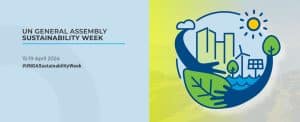
UN General Assembly Sustainability Week, 15-19 April 2024
https://www.un.org/pga/78/sustainabilityweek/
Concept Note: https://www.un.org/pga/wp-content/uploads/sites/108/2024/03/Sustainability-Week-Concept-Notes.pdf
- 15 April: High-level thematic debate on debt sustainability and socio-economic equality for all
- 16 April: High-level thematic event on tourism
- 17 April: High-level meeting on sustainable transport
- 18 April: Informal dialogue on building global resilience and promoting sustainable development through infrastructure connectivity
- 19 April: Global stocktaking marking the completion of the UN Decade of Sustainable Energy for All to further accelerate the implementation of SDG 7 of the 2030 Agenda for Sustainable Development.

Summit of the Future: Multilateral Solutions for a Better Tomorrow
22-23 September 2024
English: https://www.un.org/en/summit-of-the-future
French: https://www.un.org/fr/summit-of-the-future
Spanish: https://www.un.org/es/summit-of-the-future
The Summit is a high-level event, bringing world leaders together to forge a new international consensus on how we deliver a better present and safeguard the future. This once-in-a-generation opportunity serves as a moment to mend eroded trust and demonstrate that international cooperation can effectively tackle current challenges as well as those that have emerged in recent years or may yet be over the horizon.
Summit of the Future: What would it deliver?
https://www.un.org/sites/un2.un.org/files/our-common-agenda-summit-of-the-future-what-would-it-deliver.pdf
Zero Draft of the Pact for the Future
https://www.un.org/sites/un2.un.org/files/sotf-co-facilitators-zero-draft_pact-for-the-future.pdf
Placing gender equality at the heart of the Global Digital Compact: Taking forward the recommendations of the sixty seventh session of the Commission on the Status of Women (UN Women)
https://www.unwomen.org/en/digital-library/publications/2024/03/placing-gender-equality-at-the-heart-of-the-global-digital-compact
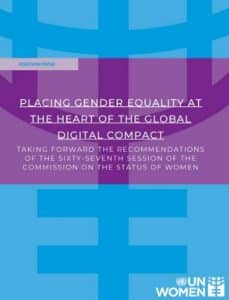 In 2024, the negotiation of the Global Digital Compact offers a unique opportunity to build political momentum and place gender perspectives on digital technology at the core of a new digital governance framework. This paper, prepared by UN Women in collaboration with the Action Coalition on Innovation and Technology for Gender Equality, aims to help governments, policymakers, multilateral organizations, the private sector, and civil society build consensus around a gender-transformative framework to advance women’s and girls’ rights and empowerment in the digital age. This paper suggests a dual track approach: 1. The inclusion of a stand-alone goal on gender equality that elevates three fundamental topics to be prioritized in every dimension of the GDC: freedom from technology-facilitated gender-based violence and discrimination; equitable educational and economic opportunities; and equal voice, leadership, and participation. 2. The robust mainstreaming of gender considerations across all parts of the framework. These ideas are not new; they build on the 2030 Agenda for Sustainable Development structure where Member States chose to mainstream gender perspectives across all the Sustainable Development Goals (SDGs) but also made the decision to have SDG5 as a stand-alone focus on gender equality. Prioritizing gender perspectives and intersectional approaches in digital cooperation has the potential to trigger transformations that set countries on paths to an equal and inclusive digital future for all, not just women and girls.
In 2024, the negotiation of the Global Digital Compact offers a unique opportunity to build political momentum and place gender perspectives on digital technology at the core of a new digital governance framework. This paper, prepared by UN Women in collaboration with the Action Coalition on Innovation and Technology for Gender Equality, aims to help governments, policymakers, multilateral organizations, the private sector, and civil society build consensus around a gender-transformative framework to advance women’s and girls’ rights and empowerment in the digital age. This paper suggests a dual track approach: 1. The inclusion of a stand-alone goal on gender equality that elevates three fundamental topics to be prioritized in every dimension of the GDC: freedom from technology-facilitated gender-based violence and discrimination; equitable educational and economic opportunities; and equal voice, leadership, and participation. 2. The robust mainstreaming of gender considerations across all parts of the framework. These ideas are not new; they build on the 2030 Agenda for Sustainable Development structure where Member States chose to mainstream gender perspectives across all the Sustainable Development Goals (SDGs) but also made the decision to have SDG5 as a stand-alone focus on gender equality. Prioritizing gender perspectives and intersectional approaches in digital cooperation has the potential to trigger transformations that set countries on paths to an equal and inclusive digital future for all, not just women and girls.
Recommendations and summary of deliberations of the United Nations Secretary-General’s High-Level Panel on the Teaching Profession (2024)
https://www.ilo.org/global/industries-and-sectors/education/WCMS_912921/lang–en/index.htm
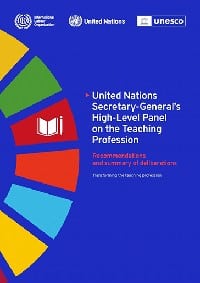 The High-Level Panel on the Teaching Profession was established by United Nations Secretary-General António Guterres following the Transforming Education Summit held in 2022. It was tasked with setting out a clear plan of action on how the teaching profession can be supported and transformed to play its essential role in creating a better world. The Panel was co-chaired by Kersti Kaljulaid, former President of Estonia, and Paula-Mae Weekes, former President of Trinidad and Tobago. Supported by a joint International Labour Organization (ILO)/United Nations Educational, Scientific and Cultural Organization (UNESCO) secretariat, the 18-member Panel drew on expertise from ministries of education and labour, employers’ organizations, teachers’ unions, teachers, students, civil society and academia. The Recommendations and summary of the deliberations of the High-Level Panel were launched on 26 February 2024 at the 14th Policy Dialogue Forum of the International Task Force on Teachers for Education 2030 in Johannesburg, South Africa.
The High-Level Panel on the Teaching Profession was established by United Nations Secretary-General António Guterres following the Transforming Education Summit held in 2022. It was tasked with setting out a clear plan of action on how the teaching profession can be supported and transformed to play its essential role in creating a better world. The Panel was co-chaired by Kersti Kaljulaid, former President of Estonia, and Paula-Mae Weekes, former President of Trinidad and Tobago. Supported by a joint International Labour Organization (ILO)/United Nations Educational, Scientific and Cultural Organization (UNESCO) secretariat, the 18-member Panel drew on expertise from ministries of education and labour, employers’ organizations, teachers’ unions, teachers, students, civil society and academia. The Recommendations and summary of the deliberations of the High-Level Panel were launched on 26 February 2024 at the 14th Policy Dialogue Forum of the International Task Force on Teachers for Education 2030 in Johannesburg, South Africa.
see also: https://www.un.org/sustainabledevelopment/blog/2024/02/teaching-profession-recommendationsteaching-profession-recommendations/
UNESCO Urban Heritage Atlas
https://whc.unesco.org/en/urban-heritage-atlas/
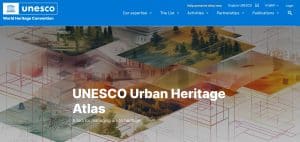 UNESCO has launched this new digital platform, that leverages the power of digital technology to support the conservation and management of the world’s historic cities and promote their diversity. The Atlas currently features 10 World Heritage cities from all regions that were part of the pilot project: Ancient Ksour of Ouadane, Chinguetti, Tichitt and Oualata, Mauritania; Asmara: A Modernist African City, Eritrea; Historic Centre of Cordoba, Spain; Historic City of Ahmedabad, India; Medina of Tunis, Tunisia; Monuments Zone of Queretaro, Mexico; New and Old Towns of Edinburgh, United Kingdom of Great Britain and Northern Ireland; Samarkand – Crossroad of Cultures, Uzbekistan; Old Towns of Djenne, Mali; Stone Town of Zanzibar, United Republic of Tanzania.
UNESCO has launched this new digital platform, that leverages the power of digital technology to support the conservation and management of the world’s historic cities and promote their diversity. The Atlas currently features 10 World Heritage cities from all regions that were part of the pilot project: Ancient Ksour of Ouadane, Chinguetti, Tichitt and Oualata, Mauritania; Asmara: A Modernist African City, Eritrea; Historic Centre of Cordoba, Spain; Historic City of Ahmedabad, India; Medina of Tunis, Tunisia; Monuments Zone of Queretaro, Mexico; New and Old Towns of Edinburgh, United Kingdom of Great Britain and Northern Ireland; Samarkand – Crossroad of Cultures, Uzbekistan; Old Towns of Djenne, Mali; Stone Town of Zanzibar, United Republic of Tanzania.
Economic Growth and Sustainable Development
Artificial intelligence governance to reinforce the 2030 Agenda and leave no one behind (E/C.16/2024/7, 29 January 2024)
English, French & Spanish: https://undocs.org/E/C.16/2024/7
“Summary: Artificial intelligence is increasingly being used worldwide with immense potential benefits, augmenting human capabilities, increasing the well-being of people and contributing to the betterment of society. However, as the technology continues to evolve at an unprecedented pace, many challenges, risks and ethical concerns remain that must be addressed urgently. Governments have a particularly important role to play, both as regulator and user of artificial intelligence, especially given their huge influence over people’s lives. The authors elaborate on the evolution of artificial intelligence, noting that it has transformed industries and the daily lives of people in ways that were once unimaginable. They also provide an overview of the potential of artificial intelligence for accelerated implementation of the 2030 Agenda for Sustainable Development, while giving a snapshot of its benefits for selected Sustainable Development Goals. The authors then elaborate on the multitude of risks and challenges associated with using artificial intelligence in the long run, especially in developing countries, raising concerns about ethics, equity, transparency and compliance with existing and emerging regulations. The authors call for artificial intelligence governance aimed at ensuring equal access to the benefits of artificial intelligence, protecting digital rights and preventing harm. They provide an overview of existing artificial intelligence governance practices while highlighting the main elements required to build a strong artificial intelligence governance framework. In closing, the authors emphasize the need to continue the ongoing global discussion and build a shared understanding of both the positive and negative impacts of artificial intelligence. Principles will have to be identified, policy priorities set and policy coherence ensured so that artificial intelligence can reinforce the 2030 Agenda and leave no one behind.”
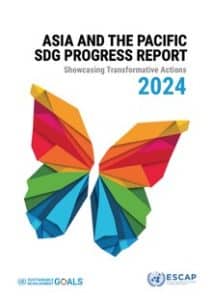 Asia and the Pacific SDG Progress Report: Showcasing Transformative Actions 2024 (ESCAP)
Asia and the Pacific SDG Progress Report: Showcasing Transformative Actions 2024 (ESCAP)
https://www.unescap.org/kp/2024/asia-and-pacific-sdg-progress-report-2024
Progress on the 17 Sustainable Development Goals (SDGs) remains uneven and inadequate across various segments of the population and within the five subregions of Asia and the Pacific. According to a new report published by the Economic and Social Commission for Asia and the Pacific (ESCAP) on 15 February 2024, gender and location remain key factors in determining levels of poverty and inequality in the region. The report takes a closer look at groups that may be disadvantaged, focusing on how sex, urbanization, education level, age and income contribute to existing disparities and sometimes exacerbate them.
Body Composition (BC) Database (IAEA)
https://www.iaea.org/resources/hhc/nutrition/databases/body-composition-bc
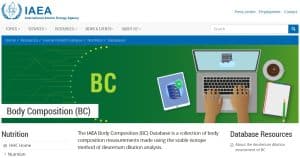 To mark World Obesity Day on 4 March, the IAEA has launched a body composition (BC) database aimed at helping countries devise better health policies to combat growing obesity challenges worldwide. Learning more about body composition, which refers to the relative amounts of fat and lean tissue that make up the body, can help experts and policy makers make more informed decisions, as body composition is a proven indicator of nutritional health.
To mark World Obesity Day on 4 March, the IAEA has launched a body composition (BC) database aimed at helping countries devise better health policies to combat growing obesity challenges worldwide. Learning more about body composition, which refers to the relative amounts of fat and lean tissue that make up the body, can help experts and policy makers make more informed decisions, as body composition is a proven indicator of nutritional health.
Carbon Prices and Inflation in the Euro Area (IMF Working Paper No. 2024/031)
https://www.imf.org/en/Publications/WP/Issues/2024/02/09/Carbon-Prices-and-Inflation-in-the-Euro-Area-544465
What is the effect of carbon pricing on inflation? This paper shows empirically that the consequences of the European Union’s Emission Trading System (ETS) and national carbon taxation on inflation have been limited in the euro area, so far. This result is supported by analysis based on a panel local projections approach, as well as event studies based on individual countries. Our estimates suggest that carbon taxes raised the price of energy but had limited effects on overall consumer prices. Since future climate policy will need to be much more ambitious compared to what has been observed so far, including the need for larger increases in carbon prices, possible non-linearities might make extrapolating from historical results difficult. We thus also use input-output tables to simulate the mechanical effect of a carbon tax consistent with the EU’s ‘Fit-for-55’ commitments on inflation. The required increase of effective carbon prices from around 40 Euro per ton of CO2 in 2021 to around 150 Euro by 2030 could raise annual euro area inflation by between 0.2 and 0.4 percentage points. It is worth noting that the energy price increases caused by the rise in the effective carbon price to 150 Euro is substantially smaller than the energy price spike seen in 2022 following the invasion of Ukraine.
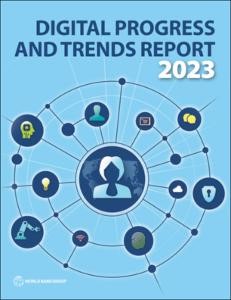 Digital Progress and Trends Report 2023 (World Bank)
Digital Progress and Trends Report 2023 (World Bank)
https://openknowledge.worldbank.org/handle/10986/40970
The Digital Progress and Trends Report series will track global digitalization progress and highlight policy trends, debates, and implications for low- and middle-income countries. The series adds to the global efforts to study the progress and trends of digitalization in two main ways: · By compiling, curating, and analyzing data from diverse sources to present a comprehensive picture of digitalization in low- and middle-income countries, including in-depth analyses on understudied topics. · By developing insights on policy opportunities, challenges, and debates and reflecting the perspectives of various stakeholders and the World Bank’s operational experiences. This report, the first in the series, aims to inform evidence-based policy making and motivate action among internal and external audiences and stakeholders. The report will bring global attention to high-performing countries that have valuable experience to share as well as to areas where efforts will need to be redoubled.
![]() Global Child Benefits Tracker
Global Child Benefits Tracker
https://www.childbenefitstracker.org/
To bolster efforts to monitor and reduce the gaps in child benefit coverage, Save the Children, ILO and UNICEF have developed the “Global Child Benefits Tracker”, an online platform to monitor children’s access to benefits, and advocate with governments and donors to close the gaps. This launch comes at a critical time when most recent data shows that 829 million children globally are living in households with per-person incomes below US$3.65 a day and progress on child poverty reduction has largely stalled.
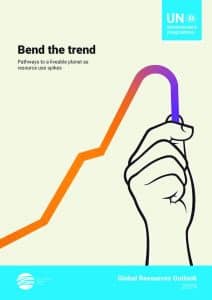 Global Resource Outlook 2024: Bend the trend; Pathways to a liveable planet as resource use spikes
Global Resource Outlook 2024: Bend the trend; Pathways to a liveable planet as resource use spikes
https://www.unep.org/resources/Global-Resource-Outlook-2024
Extraction of the Earth’s natural resources tripled in the past five decades, related to the massive build-up of infrastructure in many parts of the world and the high levels of material consumption, especially in upper-middle and high-income countries. Material extraction is expected to rise by 60 per cent by 2060 and could derail efforts to achieve not only global climate, biodiversity, and pollution targets but also economic prosperity and human well-being, according to a report published on 1 March 2024 by the UN Environment Programme (UNEP)-hosted International Resource Panel. The 2024 Global Resource Outlook, developed by the International Resource Panel with authors from around the globe and launched during the sixth session of the UN Environment Assembly, calls for sweeping policy changes to bring humanity to live within its means and reduce this projected growth in resource use by one third, while growing the economy, improving well-being, and minimizing environmental impacts. The report finds that growth in resource use since 1970 from 30 to 106 billion tonnes – or from 23 to 39 kilogrammes of materials used on average per person per day – has dramatic environmental impacts. Overall, resource extraction and processing account for over 60 per cent of planet-warming emissions and for 40 per cent of health-related impacts of air pollution.
Global Status Report for Buildings and Construction: Beyond foundations; Mainstreaming sustainable solutions to cut emissions from the buildings sector (UNEP)
https://www.unep.org/resources/report/global-status-report-buildings-and-construction
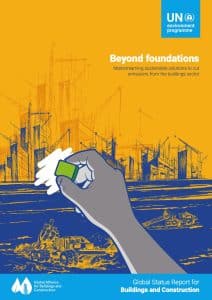 Energy demand and emissions from the building and construction sector represent over a fifth of global emissions. In 2022, a 1 per cent increase in the sector’s emissions was equal to 10 million more cars circling the Earth’s equator. At the same time, the sector’s energy intensity dropped by 3.5 per cent. These are key findings of a report published by UN Environment Programme (UNEP) and the Global Alliance for Buildings and Construction (GlobalABC) on 7 March 2024. The report tracks progress and outlines recommendations for governments, industry, and civil society towards a zero-emission, efficient, and resilient buildings sector by 2050. It was published on the first day of the Buildings and Climate Global Forum in Paris. The report finds that in 2022 the sector accounted for 37 per cent of global operational energy and process-related CO2 emissions, rising to just under 10 Gt CO2. Its energy consumption reached 132 exajoules, more than a third of global demand.
Energy demand and emissions from the building and construction sector represent over a fifth of global emissions. In 2022, a 1 per cent increase in the sector’s emissions was equal to 10 million more cars circling the Earth’s equator. At the same time, the sector’s energy intensity dropped by 3.5 per cent. These are key findings of a report published by UN Environment Programme (UNEP) and the Global Alliance for Buildings and Construction (GlobalABC) on 7 March 2024. The report tracks progress and outlines recommendations for governments, industry, and civil society towards a zero-emission, efficient, and resilient buildings sector by 2050. It was published on the first day of the Buildings and Climate Global Forum in Paris. The report finds that in 2022 the sector accounted for 37 per cent of global operational energy and process-related CO2 emissions, rising to just under 10 Gt CO2. Its energy consumption reached 132 exajoules, more than a third of global demand.
Global Waste Management Outlook 2024: Beyond an age of waste; Turning rubbish into a resource (UNEP)
https://www.unep.org/resources/global-waste-management-outlook-2024
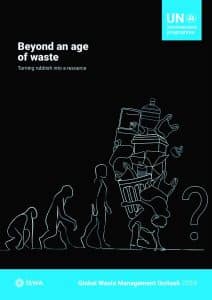 With municipal waste set to rise by two thirds and its costs to almost double within a generation, only a drastic reduction in waste generation will secure a liveable and affordable future, according to a new UN Environment Programme (UNEP) report. It provides the most substantial update on global waste generation and the cost of waste and its management since 2018. The analysis uses life cycle assessments to explore what the world could gain or lose through continuing business-as-usual, adopting halfway measures, or committing fully to zero waste and circular economy societies. According to the report, municipal solid waste generation is predicted to grow from 2.3 billion tonnes in 2023 to 3.8 billion tonnes by 2050. In 2020, the global direct cost of waste management was an estimated USD 252 billion. However, when factoring in the hidden costs of pollution, poor health and climate change from poor waste disposal practices, the cost rises to USD 361 billion. Without urgent action on waste management, by 2050 this global annual cost could almost double to a staggering USD 640.3 billion.
With municipal waste set to rise by two thirds and its costs to almost double within a generation, only a drastic reduction in waste generation will secure a liveable and affordable future, according to a new UN Environment Programme (UNEP) report. It provides the most substantial update on global waste generation and the cost of waste and its management since 2018. The analysis uses life cycle assessments to explore what the world could gain or lose through continuing business-as-usual, adopting halfway measures, or committing fully to zero waste and circular economy societies. According to the report, municipal solid waste generation is predicted to grow from 2.3 billion tonnes in 2023 to 3.8 billion tonnes by 2050. In 2020, the global direct cost of waste management was an estimated USD 252 billion. However, when factoring in the hidden costs of pollution, poor health and climate change from poor waste disposal practices, the cost rises to USD 361 billion. Without urgent action on waste management, by 2050 this global annual cost could almost double to a staggering USD 640.3 billion.
Greening the Economy of Europe and Central Asia (World Bank)
https://openknowledge.worldbank.org/handle/10986/41017
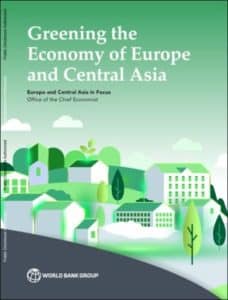 The impacts of climate change are significantly affecting the Europe and Central Asia (ECA) region, with high carbon emissions due to its heavy reliance on fossil fuels and energy-intensive economies. To transition to clean energy, substantial private and public investment and diverse policies are necessary. Pricing reforms are necessary to incentivize the private sector to adopt decarbonization measures. Tax instruments are also needed. Regulatory policies, like mandating energy efficiency and improving appliance standards, will contribute to achieving emission reduction targets. Structural policies that strengthen macroeconomic fundamentals, deepen capital markets, and improve governance are crucial. Additionally, social policies to alleviate energy poverty are essential. Tailored policies based on each country’s conditions are necessary to ensure sustainable and greener long-term growth in the ECA region. These policies should consider implementation costs and the tradeoffs between immediate environmental goals and long-term social benefits.
The impacts of climate change are significantly affecting the Europe and Central Asia (ECA) region, with high carbon emissions due to its heavy reliance on fossil fuels and energy-intensive economies. To transition to clean energy, substantial private and public investment and diverse policies are necessary. Pricing reforms are necessary to incentivize the private sector to adopt decarbonization measures. Tax instruments are also needed. Regulatory policies, like mandating energy efficiency and improving appliance standards, will contribute to achieving emission reduction targets. Structural policies that strengthen macroeconomic fundamentals, deepen capital markets, and improve governance are crucial. Additionally, social policies to alleviate energy poverty are essential. Tailored policies based on each country’s conditions are necessary to ensure sustainable and greener long-term growth in the ECA region. These policies should consider implementation costs and the tradeoffs between immediate environmental goals and long-term social benefits.
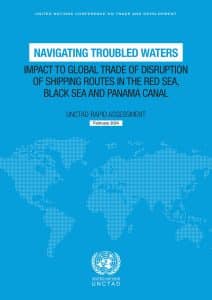 Navigating Troubled Waters: The Impact to Global Trade of Disruption of Shipping Routes in the Red Sea, the Black Sea and the Panama Canal; UNCTAD Rapid Assessment, February 2024
Navigating Troubled Waters: The Impact to Global Trade of Disruption of Shipping Routes in the Red Sea, the Black Sea and the Panama Canal; UNCTAD Rapid Assessment, February 2024
https://bit.ly/unctad-troubled-waters
According to an UNCTAD report released on 22 February 2024, attacks on shipping affecting the Suez Canal add to geopolitical tensions impacting shipping routes in the Black Sea, and severe drought due climate change disrupting shipping in the Panama Canal. UNCTAD estimates that transits passing the Suez Canal decreased by 42% compared to its peak. With major players in the shipping industry temporarily suspending Suez transits, weekly container ship transits have fallen by 67%, and container carrying capacity, tanker transits, and gas carriers have experienced significant declines. Meanwhile, total transits through the Panama Canal plummeted by 49% compared to its peak.
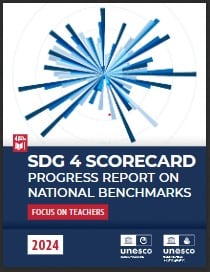 SDG 4 Scorecard Progress Report on National Benchmarks: Focus on Teachers (UNESCO)
SDG 4 Scorecard Progress Report on National Benchmarks: Focus on Teachers (UNESCO)
https://doi.org/10.54676/JPJG2407
This second edition of the SDG 4 Scorecard produced together with the UNESCO Institute for Statistics (UIS) shows the efforts that countries have been making towards achieving their 2025 and 2030 national benchmarks. It was launched at the UNESCO Conference of Education Data and Statistics, which brought together education statisticians from over 125 countries and recognized and celebrated their contributions to the benchmarking process. The report shows that progress towards benchmarks is strong on connecting primary schools to the internet and on ensuring pre-primary school teachers have minimum required qualifications, but is significantly more off track for the other six benchmark indicators. Of note are slow progress in reducing out of school rates in lower secondary: As many as 40% of sub-Saharan African countries with data have made no progress since 2015. In addition, there is a lack of data on learning proficiency to enable effective monitoring: Across primary and secondary levels, there is no data for 680 million children. Countries are moving backwards on closing gender gaps in upper secondary completion, when they have started from a position where boys are at a disadvantage, and on public education expenditure. An Africa version of the SDG 4 Scorecard was released in time for the AU Summit this month, which marked 2024 as the African Union Year of Education. It showed that, by 2025, African countries intend to halve their primary out-of-school rates to 11% and to ensure that 46% are reading with proficiency at the end of primary school. They have also committed to ensuring that 79% of teachers will be trained at the pre-primary level and 85% at the primary level.
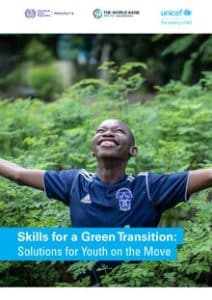 Skills for a green transition: Solutions for youth on the move (ILO / UNICEF / World Bank)
Skills for a green transition: Solutions for youth on the move (ILO / UNICEF / World Bank)
https://www.unicef.org/reports/skills-green-transition
This solutions book provides practical guidance for policymakers, program developers, and international development partners to support youth on the move, particularly those living in poverty or with low educational attainment, in accessing green skilling opportunities. It highlights the importance of including youth migrants, refugees, and forcibly displaced youth in discussions and efforts related to the green transition. The book emphasizes the need for tailored, context-specific solutions to address the unique challenges faced by youth on the move, recommending three main approaches: leveraging successful skilling programs, promoting access to green job opportunities, and fostering self-employment and entrepreneurship in green sectors. In implementing these solutions, principles of inclusion, empowerment, and protection should guide policymakers to address the diverse needs and vulnerabilities of youth on the move. Ultimately, by prioritizing the skilling needs of these youth, policymakers can contribute to a just, green transition and support their active participation in the workforce.
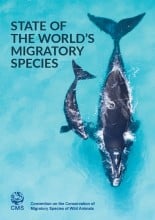 State of the World’s Migratory Species (UNEP / CMS)
State of the World’s Migratory Species (UNEP / CMS)
English, French & Spanish: https://www.cms.int/en/publication/state-worlds-migratory-species
The first-ever State of the World’s Migratory Species report was launched on 12 February 2024 by the Convention on the Conservation of Migratory Species of Wild Animals (CMS), a UN biodiversity treaty, at the opening of a major UN wildlife conservation conference (CMS COP14). The landmark report reveals: – While some migratory species listed under CMS are improving, nearly half (44 per cent) are showing population declines; – More than one-in-five (22 per cent) of CMS-listed species are threatened with extinction; – Nearly all (97 per cent) of CMS-listed fish are threatened with extinction; – The extinction risk is growing for migratory species globally, including those not listed under CMS; – Half (51 per cent) of Key Biodiversity Areas identified as important for CMS-listed migratory animals do not have protected status, and 58 per cent of the monitored sites recognized as being important for CMS-listed species are experiencing unsustainable levels of human-caused pressure; – The two greatest threats to both CMS-listed and all migratory species are overexploitation and habitat loss due to human activity. Three out of four CMS-listed species are impacted by habitat loss, degradation and fragmentation, and seven out of ten CMS-listed species are impacted by overexploitation (including intentional taking as well as incidental capture); – Climate change, pollution and invasive species are also having profound impacts on migratory species; – Globally, 399 migratory species that are threatened or near threatened with extinction are not currently listed under CMS.
Sustainable Development in the UNECE Region: Facing a Headwind in 2024
Online publication: https://w3.unece.org/sdg2024/
PDF version: https://unece.org/sites/default/files/2024-02/SDG-Report_2024_webUNOG.pdf
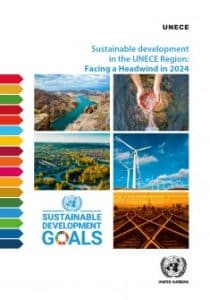 This publication provides the 2024 progress assessment on the Sustainable Development Goals (SDGs) in the region of the United Nations Economic Commission for Europe (UNECE), based on the data available in the United Nations Global SDG Indicators Database. The results are presented at the regional level, identifying the SDG targets that the UNECE region is on track to achieve by 2030 as well as targets where progress needs to accelerate or where the current trend needs to be reversed. The publication contains stories provided by agencies and United Nations country teams participating in the Regional Coordination Group on Data and Statistics for Europe and Central Asia, and by all UNECE programmes. These stories show concrete ways in which progress towards SDGs is made in the region. The publication was prepared by the UNECE Statistical Division to inform the 2024 UNECE Regional Forum on Sustainable Development (Geneva, 13 and 14 March).
This publication provides the 2024 progress assessment on the Sustainable Development Goals (SDGs) in the region of the United Nations Economic Commission for Europe (UNECE), based on the data available in the United Nations Global SDG Indicators Database. The results are presented at the regional level, identifying the SDG targets that the UNECE region is on track to achieve by 2030 as well as targets where progress needs to accelerate or where the current trend needs to be reversed. The publication contains stories provided by agencies and United Nations country teams participating in the Regional Coordination Group on Data and Statistics for Europe and Central Asia, and by all UNECE programmes. These stories show concrete ways in which progress towards SDGs is made in the region. The publication was prepared by the UNECE Statistical Division to inform the 2024 UNECE Regional Forum on Sustainable Development (Geneva, 13 and 14 March).
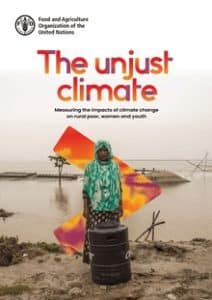 The unjust climate: Measuring the impacts of climate change on rural poor, women and youth (FAO)
The unjust climate: Measuring the impacts of climate change on rural poor, women and youth (FAO)
https://www.fao.org/documents/card/en/c/cc9680en
Climate change is disproportionately affecting the incomes of rural women, people living in poverty, and older populations, as their capacity to react and adapt to extreme weather events is unequal, this report from the Food and Agriculture Organization of the United Nations (FAO) finds. The “Unjust Climate” report highlights a stark reality: each year in low and middle-income countries (LMICs), female heads of households in rural areas suffer significantly greater financial losses than men. On average, female-headed households lose 8 percent more of their income due to heat stress and 3 percent more due to floods compared to male-headed households. This translates to a per capita reduction of $83 due to heat stress and $35 due to floods, totalling $37 billion and $16 billion respectively across all LMICs. If the average temperatures were to increase by just 1°C, these women would face a staggering 34% greater loss in their total incomes compared to men. Considering the significant existing differences in agricultural productivity and wages between women and men, the study suggests that if not addressed, climate change will greatly widen these gaps in the years ahead.
Used Heavy-Duty Vehicles and the Environment: A Global Overview of Used Heavy-Duty Vehicles: Flow, Scale and Regulation (UNEP)
https://www.unep.org/resources/report/used-heavy-duty-vehicles-and-environment-global-overview-used-heavy-duty-vehicles
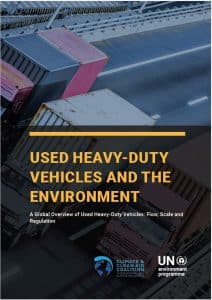 While heavy-duty vehicle (HDV) exports represent a modest 3.6% of the global automotive trade’s total value, their associated CO2 emissions have surged by over 30% since 2000, with trucks contributing 80% to this increase. Moreover, HDVs participate substantially to environmental pollution, accounting for over 40% of on-road nitrogen oxides (NOx) emissions, over 60% of on-road particulate matter (PM 2.5), and more than 20% of black carbon emissions, as revealed in the latest report by the UN Environment Programme (UNEP). The report, jointly launched by the UNEP and the Climate and Clean Air Coalition (CCAC), provides a first global overview by the UN of the scale and regulation of used HDVs and their contribution to global air pollution, road accidents, fuel consumption and climate emissions. The report recommends ways to reduce the harmful aspects of used HDVs on people’s health and the climate. According to the study, HDVs are projected to considerably continue to grow with increasing economic activities and the need to move people and goods. This is based on past trends where global sales of trucks and buses doubled in 15 years (2000-2015).
While heavy-duty vehicle (HDV) exports represent a modest 3.6% of the global automotive trade’s total value, their associated CO2 emissions have surged by over 30% since 2000, with trucks contributing 80% to this increase. Moreover, HDVs participate substantially to environmental pollution, accounting for over 40% of on-road nitrogen oxides (NOx) emissions, over 60% of on-road particulate matter (PM 2.5), and more than 20% of black carbon emissions, as revealed in the latest report by the UN Environment Programme (UNEP). The report, jointly launched by the UNEP and the Climate and Clean Air Coalition (CCAC), provides a first global overview by the UN of the scale and regulation of used HDVs and their contribution to global air pollution, road accidents, fuel consumption and climate emissions. The report recommends ways to reduce the harmful aspects of used HDVs on people’s health and the climate. According to the study, HDVs are projected to considerably continue to grow with increasing economic activities and the need to move people and goods. This is based on past trends where global sales of trucks and buses doubled in 15 years (2000-2015).
International Peace and Security
Concept note for the Security Council high-level open debate on the impact of climate change and food insecurity on the maintenance of international peace and security
English, French & Spanish: https://undocs.org/S/2024/146
This is the concept note for the high-level open debate of the Security Council on 13 February on the impact of climate change and food insecurity on the maintenance of international peace and security, convened by the delegation of Guyana in its capacity as President of the Council for February 2024.
Concept note for the Security Council open debate on the working methods of the Security Council
English, French & Spanish: https://undocs.org/S/2024/208/Rev.1
Under the presidency of Japan, the Security Council plans to hold an open debate on 11 March 2024 on the theme “Working methods of the Security Council” in connection with the item entitled “Implementation of the note by the President of the Security Council (S/2017/507)”. In this regard, Japan has prepared this concept note.
Concept note for the Security Council open debate on the theme “Peacebuilding and sustaining peace: promoting conflict prevention – empowering all actors including women and youth”
English, French & Spanish: https://undocs.org/S/2024/210
Under the presidency of Japan, the Security Council plans to hold an open debate on 13 March 2024 on the theme “Promoting conflict prevention – empowering all actors including women and youth”, in connection with the item entitled “Peacebuilding and sustaining peace”. In this regard, Japan has prepared this concept note.
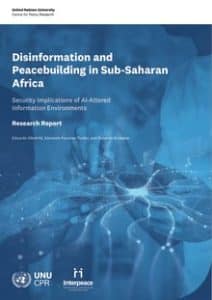 Disinformation and Peacebuilding in Sub-Saharan Africa: Security Implications of AI-Altered Information Environments (Interpeace / UNU-CPR)
Disinformation and Peacebuilding in Sub-Saharan Africa: Security Implications of AI-Altered Information Environments (Interpeace / UNU-CPR)
https://collections.unu.edu/eserv/UNU:9419/disinformation_peacebuilding_subsaharan_africa.pdf
Artificial intelligence (AI) capacity and use has developed rapidly over the last five years. As the international community increasingly focuses on establishing global governance of AI to harness its opportunities while mitigating its risks, concerns regarding AI’s impact on peace and security have grown. This concern is particularly associated with recent advancements in generative AI which have begun to be linked to increases in disinformation campaigns, cybersecurity threats, hate speech towards women and minorities, and other conflict drivers. This report aims to further explore the way in which AI technologies as they currently stand impact peace and conflict, and what methods might be used to mitigate their adverse effects – through the development of better tools and the inclusion of peace and conflict considerations in AI governance frameworks. The report proposes the following recommendations: 1. More funding and support should be provided to civil society organization efforts to expand media literacy and fact-checking initiatives using AI tools to enhance capabilities. 2. Governments need to work with civil society to develop and implement comprehensive, transparent legal frameworks combating disinformation. These legislative measures need to support digital and media literacy campaigns and fact-checking organizations. 3. Social media companies need to expand investment and research into understanding local information environments, so they can better identify and respond to instances of disinformation in all contexts in which they operate and enhance transparency. 4. Peacebuilding organizations need to carefully consider local media ecosystems and information environments when conducting conflict analyses, and factor these dynamics into their projects’ frameworks.
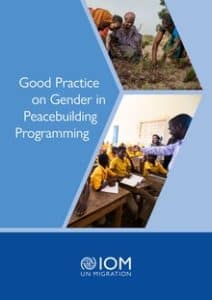 Good Practice on Gender in Peacebuilding Programming (IOM)
Good Practice on Gender in Peacebuilding Programming (IOM)
https://publications.iom.int/books/good-practice-gender-peacebuilding-programming
Gender impacts and determines the experiences of migrants, displaced persons and other crisis-affected populations, especially in fragile settings. Conflict dynamics are fundamentally gendered, and gendered norms and identities affect individual vulnerabilities as well as capacities to contribute to peace. Peace and recovery programming must account for gender dynamics to effectively address the root causes of forced migration in conjunction with delivering humanitarian support.
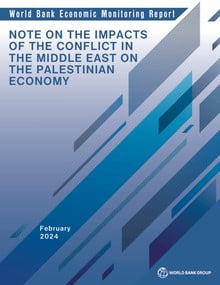 Note on the Impacts of the Conflict in the Middle East on the Palestinian Economy, February 2024 (World Bank)
Note on the Impacts of the Conflict in the Middle East on the Palestinian Economy, February 2024 (World Bank)
http://tinyurl.com/bdsj38em
Since the start of the conflict, the Palestinian economy experienced one of largest shocks recorded in recent economic history. In Gaza, GDP plummeted by more than 80 percent in Q4-2023—from approximately US$670m in Q3 to roughly US$90m in Q4. Almost all economic activity in Gaza has ground to a halt, with little indication of substantial improvement at the time of publication.
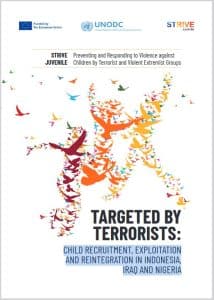 Targeted by Terrorists: Child Recruitment, Exploitation and Reintegration in Indonesia, Iraq and Nigeria
Targeted by Terrorists: Child Recruitment, Exploitation and Reintegration in Indonesia, Iraq and Nigeria
http://tinyurl.com/2875bkdm
Children around the world are victims of a serious form of violence: recruitment and exploitation by terrorist groups. Recognizing the gravity of this situation and the scarcity of related data and evidence, the UN Office on Drugs and Crime (UNODC), together with national research partners and the support of the European Union, launched this new study in Brussels, Belgium. Carried out through UNODC’s STRIVE Juvenile project, the study sheds light on the devastating phenomenon of child recruitment and exploitation by terrorist groups and incorporates field research carried out in Indonesia, Iraq and Nigeria with young adults who had been recruited by terrorist groups as children. The core protection challenges faced before, during and after association with the groups are presented, together with effective strategies to counter recruitment and exploitation. According to the report, child recruitment by terrorist groups is not exceptional and largely overlaps child recruitment by other armed and criminal groups. The emphasis on recruitment techniques and campaigns targeting children by these groups, however, demonstrates that children are a valued resource for these groups – both for economic and tactical reasons, but also as pawns that raise their visibility.
Ten Years of Occupation by the Russian Federation: Human Rights in the Autonomous Republic of Crimea and the City of Sevastopol, Ukraine
https://www.ohchr.org/en/documents/country-reports/ten-years-occupation-russian-federation-human-rights-autonomous-republic
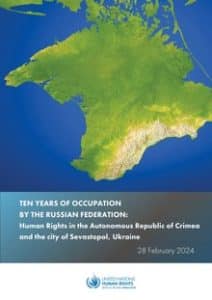 The United Nations Human Rights Monitoring Mission in Ukraine (HRMMU) has documented serious human rights and humanitarian law violations since the Russian Federation illegally annexed Crimea, an autonomous region of Ukraine, in 2014. These violations persisted throughout 10 years of occupation, as the Russian Federation consolidated its control over the peninsula. In this report, issued on 28 February 2024, HRMMU said the Russian Federation has unlawfully imposed its citizenship, laws, and institutions on Crimea’s population across all spheres of life, suppressing opposition and dissent. The report cites examples of steps taken by the Russian Federation to restrict the civic space and limit fundamental freedoms. Crimean Tatar leaders, perceived as opposing the occupation of Crimea or the Russian Federation policies, were among those particularly affected by the measures.
The United Nations Human Rights Monitoring Mission in Ukraine (HRMMU) has documented serious human rights and humanitarian law violations since the Russian Federation illegally annexed Crimea, an autonomous region of Ukraine, in 2014. These violations persisted throughout 10 years of occupation, as the Russian Federation consolidated its control over the peninsula. In this report, issued on 28 February 2024, HRMMU said the Russian Federation has unlawfully imposed its citizenship, laws, and institutions on Crimea’s population across all spheres of life, suppressing opposition and dissent. The report cites examples of steps taken by the Russian Federation to restrict the civic space and limit fundamental freedoms. Crimean Tatar leaders, perceived as opposing the occupation of Crimea or the Russian Federation policies, were among those particularly affected by the measures.
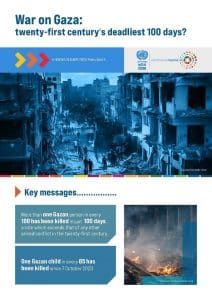 War on Gaza: twenty-first century’s deadliest 100 days? (ESCWA)
War on Gaza: twenty-first century’s deadliest 100 days? (ESCWA)
https://www.unescwa.org/publications/war-gaza-dedliest-100-twenty-first-century-policy-brief
The ongoing war on the Gaza Strip is unfolding as the most severe episode of the 56-year Israeli occupation of Gaza, including the 16-year blockade, and other unlawful Israeli policies and practices. Although Gaza has suffered previous military escalations, the 2023 war stands out as unprecedented in the scale of death, destruction, and human suffering it has incurred, with repercussions that will echo for generations to come. The unprecedented impact of the current war on Gaza demands a transformative shift in addressing mounting immediate needs, reevaluating long-term systemic challenges to relief efforts, and confronting the root causes of the conflict by ending the occupation and upholding international law.
Human Rights
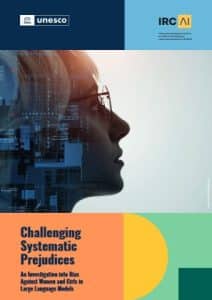 Challenging systematic prejudices: an investigation into bias against women and girls in large language models
Challenging systematic prejudices: an investigation into bias against women and girls in large language models
https://unesdoc.unesco.org/ark:/48223/pf0000388971
Released on 7 March 2024 – ahead of the International Women’s Day, a UNESCO study revealed worrying tendencies in Large Language models (LLM) to produce gender bias, as well as homophobia and racial stereotyping. Women were described as working in domestic roles far more often than men ¬– four times as often by one model – and were frequently associated with words like “home”, “family” and “children”, while male names were linked to “business”, “executive”, “salary”, and “career”.
Fact Sheet No. 26 (Rev. 1): Working Group on Arbitrary Detention
https://www.ohchr.org/sites/default/files/documents/publications/Fact-sheet-26-WGAD.pdf
This revised Fact Sheet explores the mandate and functioning of the Working Group on Arbitrary Detention, established in 1991 by the United Nations Commission on Human Rights to investigate cases of arbitrary deprivation of liberty. The publication presents the various components of the Working Group’s mandate, its procedures and operation, in addition to some of its relevant jurisprudence. It also explains how to submit a case to the Working Group and the criteria used by the Working Group to determine whether a detention is arbitrary. It further provides practical information on how to submit allegations of arbitrary detention and the relevant forms.
Human Rights: A Path for Solutions / Vision Statement offered by the United Nations High Commissioner for Human Rights, Volker Türk
https://www.ohchr.org/sites/default/files/2024-02/hc-visionstatement-2024.pdf
Key takeaways: https://www.ohchr.org/sites/default/files/2024-02/key-takeaways-infographic.pdf
“Human rights have the power to unify us at a time when we need to come together to contend with the existential challenges we face as humanity.”
UN Human Rights Chief Volker Türk on 26 February 2024 unveiled his vision to renew the commitment to human rights, which sets out to address today’s and tomorrow’s challenges, including climate change, conflict, inequality and new technologies, by restoring trust on a universal human condition and making human rights a propulsive force for change.
Presented during the 55th session of the Human Rights Council in Geneva, “Human Rights: A Path for Solutions” sets out eight directions for a better future: supporting the global constituency for human rights; human rights as the centre of prevention and peacebuilding; equal and sustainable economies that work for people and the planet; environmental action; responsive and effective governance; technology and science that uplifts all; meaningful decision making by youth and children; and strengthening the human rights system.
Human rights situation in the Occupied Palestinian Territory, including East Jerusalem, and the obligation to ensure accountability and justice – Report of the United Nations High Commissioner for Human Rights (A/HRC/55/28, 13 February 2024, Advance unedited version)
https://www.ohchr.org/en/documents/reports/ahrc5528-human-rights-situation-occupied-palestinian-territory-including-east
A UN Human Rights Office report issued on 23 February calls for accountability and justice across the board for serious violations of the laws of armed conflict and other gross human rights violations committed by all parties in Gaza, the West Bank, including East Jerusalem, and Israel over the 12-month period up to 31 October 2023. The report raises a broad range of concerns of unlawful killings, hostage-taking, the wanton destruction of civilian property, collective punishment, and deprivation of essential services, strikes on civilian infrastructure, forced displacement, incitement to hatred and violence, sexual assault and torture, all prohibited by international human rights law and/or international humanitarian law (IHL). Further investigations are needed to establish the full extent of crimes under international law committed, adds the report.
ILO Policy Brief: From global care crisis to quality care at home: The case for including domestic workers in care policies and ensuring their rights at work
English, French & Spanish: https://www.ilo.org/global/topics/domestic-workers/publications/policy-briefs/WCMS_916326/lang–en/index.htm
On International Women’s Day the International Labour Organization (ILO) has issued a new policy brief urging governments, workers’ and employers’ organizations to ensure domestic workers have access to labour rights and social protection. The publication of this brief comes at a time of growing global demand for paid care, with an increasing number of countries facing a care crisis due to large unmet care needs and ageing populations.
Practical toolkit for law enforcement officials to promote and protect human rights in the context of peaceful protests
https://www.ohchr.org/en/documents/tools-and-resources/practical-toolkit-law-enforcement-officials-promote-and-protect-human
The aim of the practical toolkit, which is based on international human rights laws, standards and good practices, is to enhance the capacity and practices of law enforcement agencies to fulfil their duty to promote and protect human rights in the context of peaceful protests.
Situation of Afghan women – Summary report of country-wide women’s consultations (February 2024) (IOM / UN Women / UNAMA)
https://unama.unmissions.org/sites/default/files/report_situation_of_afghan_women_february_2024.pdf
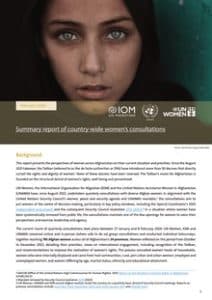 “Background: This report presents the perspectives of women across Afghanistan on their current situation and priorities. Since the August 2021 takeover, the Taliban (referred to as the de facto authorities or DFA) have introduced more than 50 decrees that directly curtail the rights and dignity of women. None of these decrees have been reversed. The Taliban’s vision for Afghanistan is founded on the structural denial of women’s rights, well-being and personhood. UN Women, the International Organization for Migration (IOM) and the United Nations Assistance Mission in Afghanistan (UNAMA) have, since August 2022, undertaken quarterly consultations with diverse Afghan women. In alignment with the United Nations Security Council’s women, peace and security agenda and UNAMA’s mandate, the consultations aim to put women at the centre of decision-making, particularly in key policy windows, including the Special Coordinator’s 2023 independent assessment and the subsequent Security Council resolution 2721 (2023). In a situation where women have been systematically removed from public life, the consultations maintain one of the few openings for women to voice their perspectives and exercise leadership and agency. The current round of quarterly consultations took place between 27 January and 8 February 2024. UN Women, IOM and UNAMA convened online and in-person (where safe to do so) group consultations and conducted individual telesurveys, together reaching 745 Afghan women across all of Afghanistan’s 34 provinces. Women reflected on the period from October to December 2023, detailing their priorities; views on international engagement, including recognition of the Taliban; and recommendations to improve the realization of women’s rights. The process consulted women heads of households; women who were internally displaced and came from host communities; rural, peri-urban and urban women; employed and unemployed women; and women differing by age, marital status, ethnicity and educational attainment.”
“Background: This report presents the perspectives of women across Afghanistan on their current situation and priorities. Since the August 2021 takeover, the Taliban (referred to as the de facto authorities or DFA) have introduced more than 50 decrees that directly curtail the rights and dignity of women. None of these decrees have been reversed. The Taliban’s vision for Afghanistan is founded on the structural denial of women’s rights, well-being and personhood. UN Women, the International Organization for Migration (IOM) and the United Nations Assistance Mission in Afghanistan (UNAMA) have, since August 2022, undertaken quarterly consultations with diverse Afghan women. In alignment with the United Nations Security Council’s women, peace and security agenda and UNAMA’s mandate, the consultations aim to put women at the centre of decision-making, particularly in key policy windows, including the Special Coordinator’s 2023 independent assessment and the subsequent Security Council resolution 2721 (2023). In a situation where women have been systematically removed from public life, the consultations maintain one of the few openings for women to voice their perspectives and exercise leadership and agency. The current round of quarterly consultations took place between 27 January and 8 February 2024. UN Women, IOM and UNAMA convened online and in-person (where safe to do so) group consultations and conducted individual telesurveys, together reaching 745 Afghan women across all of Afghanistan’s 34 provinces. Women reflected on the period from October to December 2023, detailing their priorities; views on international engagement, including recognition of the Taliban; and recommendations to improve the realization of women’s rights. The process consulted women heads of households; women who were internally displaced and came from host communities; rural, peri-urban and urban women; employed and unemployed women; and women differing by age, marital status, ethnicity and educational attainment.”
Situation of human rights in the Sudan: Report of the United Nations High Commissioner for Human Rights (A/HRC/55/29, 22 February 2024)
https://www.ohchr.org/sites/default/files/documents/hrbodies/hrcouncil/sessions-regular/session55/advance-versions/a-hrc-55-29-auv.docx (Advance unedited version)
The armed conflict in Sudan has resulted in thousands of civilians killed, millions displaced, property looted, and children conscripted, as fighting has spread to more regions of the country, says a wide-ranging report from the UN Human Rights Office. The report details multiple indiscriminate attacks by both the Sudanese Armed Forces (SAF) and the Rapid Support Forces (RSF) in densely populated areas, including sites sheltering internally displaced people – particularly in the capital Khartoum, as well as in Kordorfan and Darfur – during fighting between April and December 2023.
Study on the criminalization of Indigenous Peoples’ rights: Note by the Secretariat (E/C.19/2024/6, 2 February 2024)
English, French & Spanish: https://undocs.org/E/C.19/2024/6
“Summary: At its twenty-second session, the Permanent Forum on Indigenous Issues appointed Naw Ei Ei Min and Rodrigo Eduardo Paillalef Monnard, members of the Forum, to conduct a study to examine the criminalization of Indigenous Peoples’ human rights, to be submitted to the Forum at its twenty-third session. The present note contains the report on the study. The study was focused on the typology and examples of criminalization, relevant international instruments and jurisprudence and access to justice, and conclusions and recommendations.”
Two-Year Update – Protection of civilians: impact of hostilities on civilians since 24 February 2022 (OHCHR)
https://www.ohchr.org/en/documents/country-reports/two-year-update-protection-civilians-impact-hostilities-civilians-24
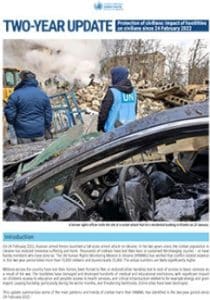 “Introduction: On 24 February 2022, Russian armed forces launched a full-scale armed attack on Ukraine. In the two years since, the civilian population in Ukraine has endured immense suffering and harm. Thousands of civilians have lost their lives or sustained life-changing injuries – or have family members who have done so. The UN Human Rights Monitoring Mission in Ukraine (HRMMU) has verified that conflict-related violence in this two-year period killed more than 10,000 civilians and injured nearly 20,000. The actual numbers are likely significantly higher. Millions across the country have lost their homes, been forced to flee, or endured other hardship due to lack of access to basic services as a result of the war. The hostilities have damaged and destroyed hundreds of medical and educational institutions, with significant impact on children’s access to education and people’s access to health services, and critical infrastructure related to for example energy and grain export, causing hardship, particularly during the winter months, and threatening livelihoods. Entire cities have been destroyed. This update summarizes some of the main patterns and trends of civilian harm that HRMMU has identified in the two-year period since 24 February 2022.”
“Introduction: On 24 February 2022, Russian armed forces launched a full-scale armed attack on Ukraine. In the two years since, the civilian population in Ukraine has endured immense suffering and harm. Thousands of civilians have lost their lives or sustained life-changing injuries – or have family members who have done so. The UN Human Rights Monitoring Mission in Ukraine (HRMMU) has verified that conflict-related violence in this two-year period killed more than 10,000 civilians and injured nearly 20,000. The actual numbers are likely significantly higher. Millions across the country have lost their homes, been forced to flee, or endured other hardship due to lack of access to basic services as a result of the war. The hostilities have damaged and destroyed hundreds of medical and educational institutions, with significant impact on children’s access to education and people’s access to health services, and critical infrastructure related to for example energy and grain export, causing hardship, particularly during the winter months, and threatening livelihoods. Entire cities have been destroyed. This update summarizes some of the main patterns and trends of civilian harm that HRMMU has identified in the two-year period since 24 February 2022.”
Humanitarian Affairs
Inclusion of Migration and Migrants in Climate-resilient Development Pathways in the Context of the European Green Deal (IOM)
https://publications.iom.int/books/inclusion-migration-and-migrants-climate-resilient-development-pathways-context-european
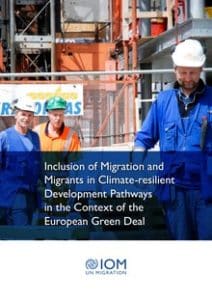 Enhancing the coherence between migration and climate action policy within the European Union’s internal and external policy should be a priority in the context of the envisaged green transition in the European Union. This report argues that the European Green Deal, which is a focus of this report, as well as policy frameworks that include migration to a greater extent, such as the New Pact on Migration and Asylum, should further be more strongly merged with agendas such as the European Skills Agenda or the Skills and Talent Package. Concretely, climate-resilient development should be firmly anchored in the design and the implementation of (labour) mobility schemes and attempts to reskill and upskill migrant workers – and vice versa, migration-related considerations must be integrated into the major frameworks for achieving climate-resilient development. Developing, strengthening and harmonizing talent recognition frameworks between the European Union and third-country partners can lift the pressure from the European labour market and entail lasting and sustainable partnerships. The revision and extension of European Labour Market Information Systems and investments in vocational education and training and general education with a clear focus on climate-resilient development are essential in that regard.
Enhancing the coherence between migration and climate action policy within the European Union’s internal and external policy should be a priority in the context of the envisaged green transition in the European Union. This report argues that the European Green Deal, which is a focus of this report, as well as policy frameworks that include migration to a greater extent, such as the New Pact on Migration and Asylum, should further be more strongly merged with agendas such as the European Skills Agenda or the Skills and Talent Package. Concretely, climate-resilient development should be firmly anchored in the design and the implementation of (labour) mobility schemes and attempts to reskill and upskill migrant workers – and vice versa, migration-related considerations must be integrated into the major frameworks for achieving climate-resilient development. Developing, strengthening and harmonizing talent recognition frameworks between the European Union and third-country partners can lift the pressure from the European labour market and entail lasting and sustainable partnerships. The revision and extension of European Labour Market Information Systems and investments in vocational education and training and general education with a clear focus on climate-resilient development are essential in that regard.
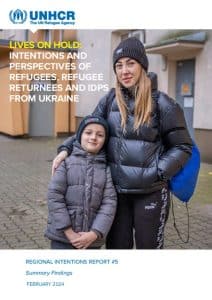 Lives on hold: Intentions and Perspectives of Refugees, Refugee Returnees and IDPs from Ukraine #5 Summary Findings (UNHCR)
Lives on hold: Intentions and Perspectives of Refugees, Refugee Returnees and IDPs from Ukraine #5 Summary Findings (UNHCR)
https://data.unhcr.org/en/documents/details/106738
Introduction: To ensure the centrality of the voices of refugees and internally displaced people (IDPs) from Ukraine in discussions about their future, as well as to inform evidence-based policy responses in host countries and in Ukraine, UNHCR has been implementing a series of intentions surveys, collecting primary data on refugees and internally displace people profiles, their current situation and their intentions, and the factors influencing their decision-making. Complementing previous reports, this report presents the summary findings from the latest round of data collection including, for the first time, findings related to the experiences and current situation of refugee returnees. The full report with all detailed findings will be published separately. The analysis is based on interviews undertaken between January and February 2024 with close to 4,000 refugee households across Europe, 4,800 internally displaced people households in Ukraine and close to 1,100 refugee returnee households in Ukraine (for an overall sample of over 9,900 households, out of which more than of 2,400 households responded to this and the previous rounds considered as “longitudinal sub-sample”). The research used a mixed methodology combining phone and web-based surveys and using different sampling approaches for each population based on available data. Sampling and data collection was conducted by Ipsos SA.
Nuclear, Chemical and Conventional Weapons Disarmament
The Historical Impact of Parliamentary Diplomacy on Disarmament (UNODA)
https://front.un-arm.org/wp-content/uploads/2024/02/Civil-Society-and-Disarmament-2023.pdf
“Abstract: This paper examines the key role of parliamentary diplomacy in foreign affairs, focusing specifically on its influence in the field of disarmament. It analyses the impact parliamentarians can have on these issues, identifying a number of good practices and effective strategies. In addition, it offers specific policy recommendations and highlights resources available to strengthen the capacity of parliaments and other stakeholders to enhance and expand their influence in promoting effective disarmament agreements at the international level.”
Justice and International Law
Women, Business and the Law 2024 (World Bank)
Report in English, Executive Summary in English, French & Spanish:
https://openknowledge.worldbank.org/handle/10986/41040
 Women, Business and the Law 2024 is the 10th in a series of annual studies measuring the enabling conditions that affect women’s economic opportunity in 190 economies. To present a more complete picture of the global environment that enables women’s socioeconomic participation, this year Women, Business and the Law introduces two new indicators—Safety and Childcare—and presents findings on the implementation gap between laws (de jure) and how they function in practice (de facto). This study presents three indexes: (1) legal frameworks, (2) supportive frameworks (policies, institutions, services, data, budget, and access to justice), and (3) expert opinions on women’s rights in practice in the areas measured. The study’s 10 indicators—Safety, Mobility, Workplace, Pay, Marriage, Parenthood, Childcare, Entrepreneurship, Assets, and Pension—are structured around the different stages of a woman’s working life. Findings from this new research can inform policy discussions to ensure women’s full and equal participation in the economy. The indicators build evidence of the critical relationship between legal gender equality and women’s employment and entrepreneurship. Data in Women, Business and the Law 2024 are current as of October 1, 2023.
Women, Business and the Law 2024 is the 10th in a series of annual studies measuring the enabling conditions that affect women’s economic opportunity in 190 economies. To present a more complete picture of the global environment that enables women’s socioeconomic participation, this year Women, Business and the Law introduces two new indicators—Safety and Childcare—and presents findings on the implementation gap between laws (de jure) and how they function in practice (de facto). This study presents three indexes: (1) legal frameworks, (2) supportive frameworks (policies, institutions, services, data, budget, and access to justice), and (3) expert opinions on women’s rights in practice in the areas measured. The study’s 10 indicators—Safety, Mobility, Workplace, Pay, Marriage, Parenthood, Childcare, Entrepreneurship, Assets, and Pension—are structured around the different stages of a woman’s working life. Findings from this new research can inform policy discussions to ensure women’s full and equal participation in the economy. The indicators build evidence of the critical relationship between legal gender equality and women’s employment and entrepreneurship. Data in Women, Business and the Law 2024 are current as of October 1, 2023.
Drug Control, Crime Prevention and Counter-terrorism
Report of the International Narcotics Control Board for 2023
English, French & Spanish: https://www.incb.org/incb/en/publications/annual-reports/annual-report.html
The evolving landscape of online drug trafficking is presenting new challenges to drug control, says the International Narcotics Control Board (INCB) in its Annual Report. There are also opportunities to use the Internet for drug use prevention and treatment to safeguard people’s health and welfare, the Board says. The increased availability of illicit drugs on the Internet, the exploitation by criminal groups of online platforms including social media, and the increased risk of overdose deaths due to the online presence of fentanyl and other synthetic opioids are some of the key challenges for drug control in the Internet era. Using social media and other online platforms means drug traffickers can advertise their products to large global audiences. Various conventional social media platforms are being used as local marketplaces and inappropriate content is widely accessible to children and adolescents.
Newsletter Archive: https://unric.org/en/unric-info-point-library-newsletter-archive



